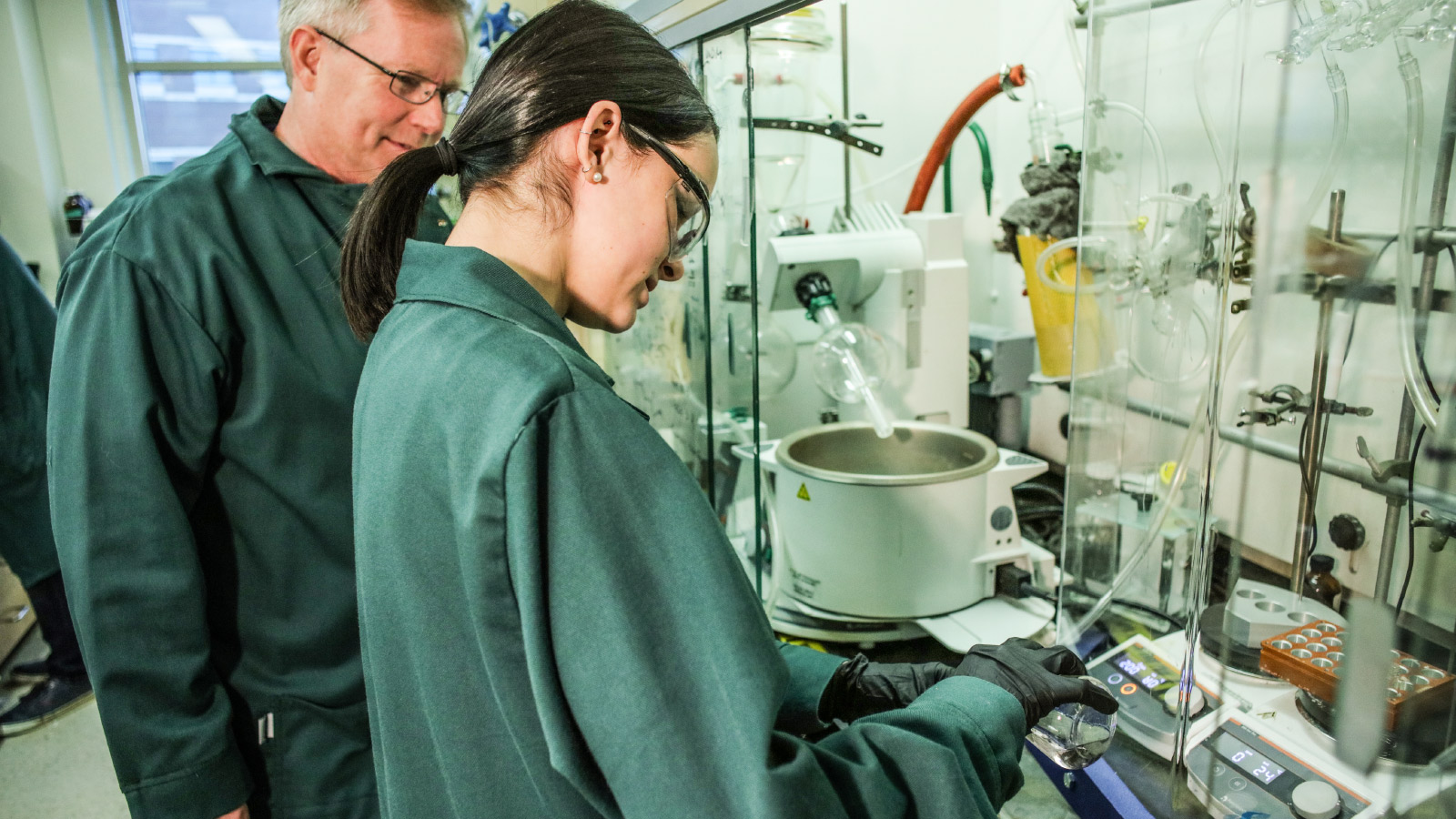A Mentorship Focus

It takes patience to do cancer research. The rewards are not immediate and results may not come in a researcher’s life time. For Baylor cancer researchers, there is an understanding that the work they do will have its greatest impact on future generations—so, it makes sense that much of their focus is on the next generation.
Mentorship is a hallmark of Baylor research at the undergrad and graduate level. Meet three Baylor professors whose purposeful interaction with their students in and out of the lab trains future professionals to fight disease.
John L. Wood, Ph.D., is the Robert A. Welch Distinguished Professor and Cancer Prevention Research Institute of Texas Scholar. His research focuses on chemical synthesis that could lead to drug development. Wood came to Baylor in 2013 after serving as a faculty member at Yale University for 13 years and 7 years at Colorado State.
Jung Hyun Min, Ph.D., is an Associate Professor of Chemistry and the leads the Min Research Laboratory Group with a focus on understanding how cellular DNA repair works. Her 2019 study in Nucleic Acids Research was published as a “breakthrough” article.
Leigh Greathouse, Ph.D., is an Associate Professor in Nutrition Sciences at Baylor University. The Greathouse Research Laboratory focuses on the relationship between diet, gut health and disease. She earned a coveted (https://www.baylor.edu/research/news.php?action=story&story=219829) Career Development Award from the Department of Defense in 2020 among numerous awards. Greathouse’s research is motivated by her own battle with cancer as a young woman.
They share their thoughts on the heart of cancer research, mentorship and more.
How would you describe your approach to fighting cancer?
John Wood: In my lab, I train students how to put molecules together one atom at a time. The students in my laboratory move on to positions in either academia or industry, typically in pharmaceutical companies, where they will be developing new drugs that can be for the treatment of any kind of disease.
Leigh Greathouse: My research group focuses on understanding the interaction between what we eat and how that affects the bacteria that live in our body, specifically related to cancer development and treatment response. We try to understand the factors in our diet that most impact the bacteria that are related to cancer development.
Jung Hyun Min: In our lab, we try to understand how DNA damages gets repaired in cells. The relationship to cancer is pretty intimate because the cancer is basically a disease of mutations, and mutations often originate from unrepaired DNA damage.
In your own ways, each of you are tackling perhaps the biggest human health challenge out there. What drives you in playing a very, very long game?
Leigh Greathouse: I by no means think that I'm going to identify a cure for cancer—hopefully something that, in the future, will help a number of people with different types of cancer. My own struggle with cancer really is what keeps driving me to solve these big problems that we are facing on a regular basis—things like treatment response, long term side effects. How can we reduce those with simple, or perhaps more complicated, interventions? What really keeps my scientific curiosity going is tackling some of those bigger problems that cancer patients face.
John Wood: Well, for me, when it comes to the long game, the unique thing about this job is that I'm the only one getting older here. I have a constant turnover of students in my laboratory and they're all static in terms of being between that 20 and 25-year age. To me, maintaining momentum over a number of years has never been so much about the contributions that our research would be making to a bigger problem. It's just been the day-to-day transformation you see taking place in your students and how they function as a research group.
What does mentorship mean to you?
John Wood: For me, the single most rewarding and best part of my job is to have a student contribute an idea to their project and have that idea come to fruition. Because when that happens, you can see in that student's eyes, you can see in that student's work ethic, a transformation take place where they have taken ownership of their research project. It's theirs and you know that by enabling this transformation that person's going to go on and have a great career in this field because guiding one’s own research develops self-confidence. That's the best, most motivating thing that happens to me and what keeps me wanting to come back.
Jung Hyun Min: It is something that I take as my huge responsibility. I think developing personal rapport and trust is very important. With my students, I try to share my experiences and anecdotes when I was a student or a postdoc. Stories and anecdotes from others were helpful for me when I was a trainee. I'm hoping that they would be helpful for my students too and they know that they are not alone. Another thing I take seriously in teaching my student is in developing their ability to look at scientific results and literature in a critical and objective manner and to describe their understanding in their own words.
Leigh Greathouse: It’s a driving force, the fact that I get to mentor new young burgeoning scientists that will hopefully go out there one day and do amazing things in their career, and bring new technologies or new thoughts or new findings, and really developing them to have high ethical standards. It helps me as a scientist too, getting to have all these new ideas, getting to share with them their life. It helps us become a team, a family. I’m honest with them about the struggles and joys so that they see what it takes and recognize if this is what they can see themselves doing.